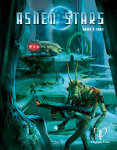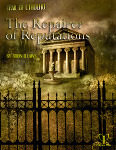Robin D. Laws's Blog, page 99
September 6, 2011
Process vs. Outcome
 When developing a sub-system for an RPG rules engine, two qualities of a successful mechanic can fall out of sync. Let's call these qualities process and outcome.
When developing a sub-system for an RPG rules engine, two qualities of a successful mechanic can fall out of sync. Let's call these qualities process and outcome.
A sub-system with a strong process is: easily learned easily remembered once learned fast engaging
In other words, when you set out to use the rule in play, it goes quickly and smoothly, with a minimum of head-scratching.
A successful rules sub-system must also fulfill its purpose in the game, whatever that might be. In addition to the general goals of the process category, does it achieve the specific goal or goals of this particular project? If it's a space combat system that's supposed to feel a little bit tactical and give everyone on the ship something to do, does it achieve that? If it's supposed to streamline investigative play, does it do that?

When it does, you've got a sub-system that contributes a desired outcome to the overall design.
Although DramaSystem focuses on dramatic and not procedural moments, it does need some way to work out whether characters succeed at external, pragmatic tasks, when they arise. Until recently I had a system for this that had good process but an unsatisfactory outcome. Procedural scenes "worked": they were fun and simple in play. Yet they tended to come out the same way every time: the characters won, after accepting terrible consequences. This represented a failure of emulation; characters in dramatic shows don't have to pay an awful price for every success. That sent me back to the drawing board. I think the new system has both process and outcome, but then I always think that. More testing will tell the tale.
Sometimes you'll have the opposite problem: a sub-system that gets you where you want to be, but in a manner that is unacceptably complicated, slow, or counter-intuitive. Your audience's tolerance for difficult rules may change the definition of "unacceptably."
September 2, 2011
Link Round-Up: Dragons Love Ashen, MJ's a Mutant
 After the hosts wrestle with combat, the house dragon of the 2gms 1mic podcast gives Ashen Stars two wings up.
After the hosts wrestle with combat, the house dragon of the 2gms 1mic podcast gives Ashen Stars two wings up.
Impossible Mary Jane pose, mocked by wags.
Korad: Ideology Vote Redux
Okay, the process by which we vote by liking comments clearly isn't panning out. It requires people to remember to give a blog post a second look. When I put it that way, the flaw inherent in the system becomes obvious. So, one last time, let's review the choices and vote with a poll over on the old mothership.
One of these ideologies will grow from obscurity to change Korad. Two others will do likewise to test the mettle of the eventual victor. I have taken the liberty of renaming some of the choices into handy -ism forn. They are:
Candlism. "The Candle in the Darkness" is a stoic path that blurs the line between religion and philosophy. The Candle in the Darkness is a school of thought that focuses on sharp rationality and observed phenomena. Gods are discussed in the same tone as ghosts and chivari apes - to be studied and respected exactly as much as direct observation suggests is necessary. While not, strictly speaking, an atheist movement, The Candle in the Darkness has the scorn and hatred of the religious organizations for the way it denounces faith and prayer.
Gentility. The Gentle Prince, a warrior demiurge, turned his back on the strife and violence associated with the Black Goat of the Fens and built a land of peace and ease. All who accept his path have a place prepared for them there. The Gentle Prince teaches loving submission to those greater than yourself and forgiveness for all who ask it. Surrendering to the will of the Gentle Prince (and his clergy) guarantee a place in paradise after death, and protection from the violent and hateful ways of the Black Goat and her angry children.
Nonism: Based on the teachings of nine masters who have since elevated to divinity through perfection of their philosophical purity. Themes include grace, beauty, and aesthetic excellence in one's duties. The Glorious Nine teach that a useful thing is wonderful, but a thing that is useful and beautiful brings us closer to unity with the godhead, and that a joyful heart is as important as a clever mind.
Satirism: Koradian freedman culture is often overlooked, largely because of the permanent second-class, yet not actually oppressive, citizenship that it imposes. Still, it was probably inevitable that certain of its members would turn to magic (the traditional pastime of slightly disreputable social classes everywhere); and it was probably also likely that said magic would break a mainstream Koradian taboo (in this case, the one against frivolity). Needing to keep said frivolity hidden from obvious discovery meant that its practitioners needed to grow adept at hidden meanings of texts and subtle shadings of speech: a Satirist spell is typically a well-disguised mockery of an existing artistic form, with a direct ratio between the power of the spell and the subtlety of the mockery. It is said that a true adept can transmit a blessing or a curse in a simple "Good morning." And then it was discovered that the spell for ensuring the sex of a child was easily within the powers of the adepts... provided that the woman who was the target of the spell accepted the central teaching of the Satirists: "Life is absurdly good." Which sounds a lot more transgressive in the original.
Symbotomism combines anti-Aesigil views with extreme devolutionism. They believe that the Aesigils have had undue influence on the development of human civilization and culture, and it is now necessary to expunge all symbols used to adorn bodies, clothing, architecture... even going so far as to advocate the destruction of all written records and language itself. Humans will become perfect when they develop their own thoughts and language without Aesigil influence.
Head over to LJ to vote for your favorites.
September 1, 2011
Link Round-Up: Repairer Reviewed, Santeria Smear, Detective Dee
 The Repairer of Reputations scores a gratifying review at RPGnet.
The Repairer of Reputations scores a gratifying review at RPGnet.
Mirror appliques on mayoral campaign signs prompt Santeria smear.
Tsui Hark's delirious return to wuxia form, Detective Dee and the Mystery of the Phantom Flame, starts its limited US theatrical run tomorrow. One of my faves from last year's TIFF. Reindeer fu!
Illustrations and Expectations, or the Four-Gun Kch-Thk
 In what might be our first Ashen Stars FAQ, I've been asked if Jerome Huguenin's cool image of a kch-thk warrior means that player characters of his locust-like species get four Shooting attacks per round. As the questioner pointed out, the illo will have his players making an impassioned case for it.
In what might be our first Ashen Stars FAQ, I've been asked if Jerome Huguenin's cool image of a kch-thk warrior means that player characters of his locust-like species get four Shooting attacks per round. As the questioner pointed out, the illo will have his players making an impassioned case for it. The reality is that Jerome came up with a great idea for an illustration independent of a specific crunchy bit in the rules text. Getting a roleplaying game out the door and into your hands is a long enough process without a stage where we look at the art and see if we want to rebalance character abilities based on what it seems to promise players. The ever-hungry kch-thk already come with a nifty array of unique schticks, not the least of which is being able to migrate their discarnate identities into new, fa
 st-growing larval forms when they get killed. The idea of immediately adding yet another bit of defining crunch without testing for balance fails the caution test.
st-growing larval forms when they get killed. The idea of immediately adding yet another bit of defining crunch without testing for balance fails the caution test. For the moment, let's say that some kch-thk fire four-handed, but that this is a style move. Holding four weapons is easier than coordinating them, even if the shooter sports a set of compound eyes. In the end the four-handers are no more effective than any highly-trained marksman carefully firing a single gun.
The four-handed stance might also show us what it looks like when kch-thk crew members make Intimidation spends. Sure, maybe their accuracy leaves something to be desired. It's still a hell of a way to bust into a room.
(Or he might just be holding four special scanning devices. But that would be too much of a buzzkill, wouldn't it?)
August 31, 2011
Link Round-Up: New Policy, Three-Act Cat
In a world of ever-declining standards, sometimes it becomes necessary to draw a line.
And, look, I don't normally do this. But what can I say? I'm a sucker for a perfect three-act structure:
Korad: Call For Votes
 Suggestions are in for the three ideologies that will rise to challenge the old order in Korad. If you haven't done so already, pop over to the original thread now, and vote by liking your favorite of the comments.
Suggestions are in for the three ideologies that will rise to challenge the old order in Korad. If you haven't done so already, pop over to the original thread now, and vote by liking your favorite of the comments.
The Birds: Ask
August 30, 2011
Dead Enders
 While this exploration of an abandoned Libyan state security station is overall as chilling as you'd expect, a surprising poignancy attaches to certain passages. In the maw of the beast, Walter Mitty daydreams:
While this exploration of an abandoned Libyan state security station is overall as chilling as you'd expect, a surprising poignancy attaches to certain passages. In the maw of the beast, Walter Mitty daydreams:
Hidden away inside the door of a filing cabinet, in a spot where few eyes would see them, were pictures and postcards from places a Libyan security staffer might only dream about: England, Lebanon, the pastoral countryside of rural America.
Having boldly declared that I would be on the record as having supported the Western support campaign for the Libyan rebels if it turned out to have worked, I can now courageously declare myself to have been right all along.
The fighting's not over yet, unfortunately. Where in Iraq regime supporters melted away in the face of Western ground troops, Libya's civil war remains hot. At first the ferocity of the dead-enders seems inexplicable. Why not attempt an opportunistic last-minute pivot to the winning side? Presumably the guys who are still shooting know (or at least believe) that they were in so deep with the old regime that they're irreparably screwed in the new one. Resistance, no matter how desperate, seems the only good option. Or perhaps the dead-enders are simply as psychopathic as the man and regime they loyally followed until now. Certain last minute massacres may be exercises in killing the witnesses.
Iraqi resisters vanished to fight another day, knowing they'd have a foreign occupier to mount an insurgency against—and thus at least a plausible path back to power. This strategy ultimately failed, but wasn't crazy. Their Libyan counterparts know they'll only face the people they oppressed, and who despise them. As Irony and War are long-standing drinking buddies, it maybe shouldn't come as a surprise that an environment that starves a long term insurgency comes at the cost of near term savagery.
August 29, 2011
The Hearing Trumpet
 As devoted as they were to the triumph of the irrational over the conventional, of the anarchic and revolutionary over conventional authority, the fractious assemblage of artists who called themselves surrealists were notoriously a boy's club. The artist Leonora Carrington, who died this year at the age of 93, elbowed her way into their movement, deflated their chauvinism, and outlived them all.
As devoted as they were to the triumph of the irrational over the conventional, of the anarchic and revolutionary over conventional authority, the fractious assemblage of artists who called themselves surrealists were notoriously a boy's club. The artist Leonora Carrington, who died this year at the age of 93, elbowed her way into their movement, deflated their chauvinism, and outlived them all.
Her 1976 novel The Hearing Trumpet (which appeared first in French, in 1974, and was subsequently self-translated) has yet to find the full readership it warrants. No doubt this is because Carrington was reaching out of her visual arts box.
The book opens as a kooky first-person account of the admittedly ancient and eccentric Marian Leatherby. When a friend gifts her with a prodigiously effective hearing trumpet, she learns that her family intends to send her to a home. The institution, run by a pair of parsimonious, judgmental Christian mystics, houses its inmates in bizarre structures in such shapes as a lighthouse, an igloo, and a circus tent. Marian's fascination with the dining hall's portrait of a leering, winking nun leads her to a mysterious medieval text of sorcery, corruption, Templars and a Holy Grail that serves as a font of suppressed women's magic. And that's where it gets crazy.
Experimental in content but clear in its narrative presentation, The Hearing Trumpet is not just daffy but genuinely playful and funny. At the risk of spoilerage, its final cataclysm earns its expatriate author a uniquely feminist (not to mention lycanthropic) spot in the literature of cozy British apocalypse. A neglected classic that deserves sit on any shelf where the literary and the fantastical collide, alongside Borges, Calvino, and Pavic's Dictionary of the Khazars.




